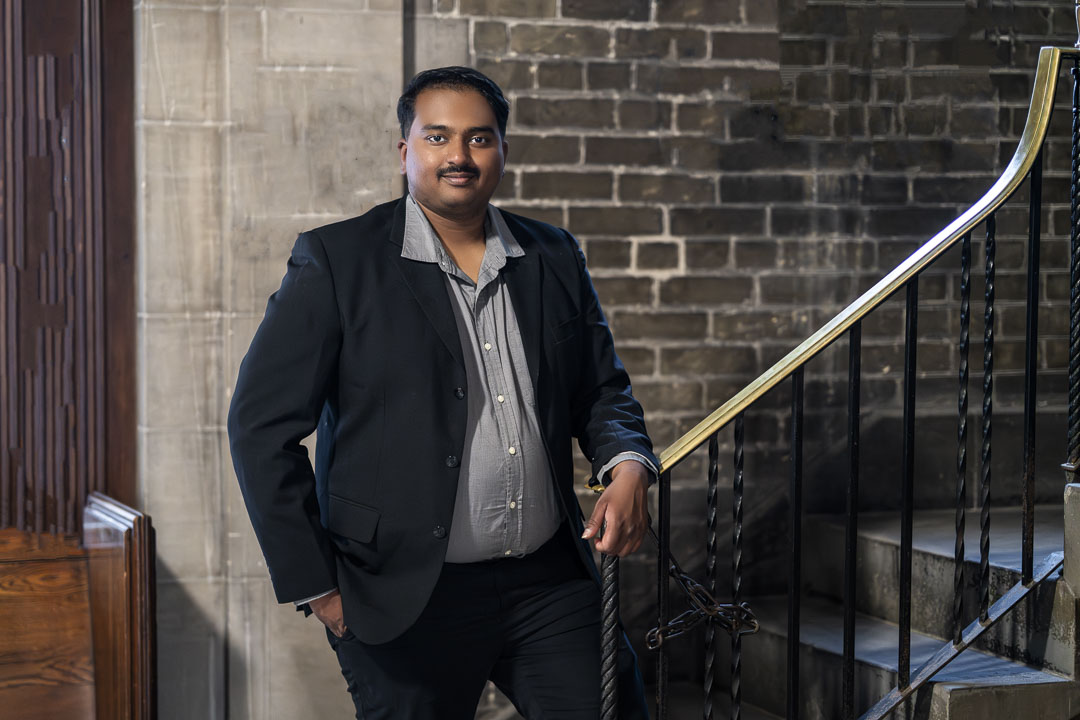Meet spring 2024 graduate and Student Leadership Award winner Vithusan Arunakirinathan
Categories: Awards & Recognition, Students
Growing up, Vithusan Arunakirinathan often interacted with social workers in the health-care system through his family caregiving role, so he saw firsthand what a crucial difference they could make. “I met some amazing social workers, but I realized there weren’t many that looked like me, and not all of them addressed the cultural and social differences that can affect an individual’s care,” he says. As a new graduate of the Factor-Inwentash Faculty of Social Work, Arunakirinathan is determined to help bridge those gaps.
He has many reasons to celebrate this spring: convocation, a new job and a 2024 University of Toronto Student Leadership Award. The award recognizes Arunakirinathan’s many contributions to the faculty, including reviving social work’s Graduate Student Association, which lapsed in the pandemic, and promoting interprofessional education as an Interprofessional Education Representative.
“I’m proud of the fact that we built back trust in student government and started important conversations with professors and administrators,” he says. “A lot of the dialogue was about advancing equity, so we were happy when the faculty hired a Director of Equity, Diversity and Inclusion in 2023.”
Arunakirinathan’s drive to support marginalized populations grew out of his personal experience, but also out of a growing awareness of inequity, gained through education and employment in the community services sector.
His first ambition was a career in medicine. Then, during an undergraduate degree in health sciences, Arunakirinathan took a course on the social determinants of health that transformed his outlook and career goal. “I knew from direct observation that factors like education, income and race affected health outcomes, but I didn’t have words or research evidence for it,” he says.
The newfound knowledge deepened Arunakirinathan’s focus on equity and social justice. “I wanted to provide holistic, wrap-around care and address systemic barriers” he says. This led him to complete a graduate certificate in addictions and mental health, followed by jobs in housing support, harm reduction and community health, where many of his clients were racialized people, immigrants and refugees.
“Being a second-generation Tamil immigrant from Sri Lanka, it hit close to home when I saw that the Western approach in the social services system was discriminating against racialized individuals,” says Arunakirinathan, citing the example of a frequent lack of language interpreters and attitudinal barriers which limit access to quality and equitable care. “I advocated for things but felt like I wasn’t getting anywhere. That’s when I knew it was time to pursue my master’s in social work.”
He’d considered doing the degree over his years working on the frontlines, but wasn’t ready to commit. “I’m a first-generation university student and didn’t have anyone to guide me in that decision,” says Arunakirinathan. “But I eventually realized that I needed to learn how to do research and policy briefs and all the things that can bring change.”
He chose U of T for his MSW because of its clinical focus, research strength and emphasis on interprofessional collaboration. Alongside his MSW degree, Arunakirinathan completed the interprofessional education curriculum at the Centre for Advancing Collaborative Healthcare & Education, a partnership of U of T, the Academic Health Science Network and the University Health Network.
“Social workers can be leaders in always ensuring that teams consider issues through an equity and social justice lens and trying to break down barriers to clients’ wellbeing,” says Arunakirinathan, who facilitated educational sessions on interprofessional practice for MSW students and students from across the health-related disciplines at U of T.
He applied these practice principles and other expertise gained in the MSW program in his first practicum, where he supported patients and families at a long-term care facility. “The placement reinforced my sense that I was meant to be a social worker,” says Arunakirinathan. “My heart was there because it was tied to my lived experience, but also because I immediately knew there was power in the skills I was learning from the MSW program.”
In his new position as a social worker in complex general psychiatry at Ontario Shores Centre for Mental Health Sciences, where he completed his second practicum, Arunakirinathan is an integral part of a team supporting individuals diagnosed with serious mental illness. “I’ve been in the human services and community services fields for a while, but now I can call myself a social worker,” he says. “I feel confident, and I believe I’m already contributing to the lives of my clients.”
Story by Megan Easton / Photo by Colleen Lightbody
We asked Vithusan: What advice do you have for incoming MSW students?
As new Masters of Social Work students, it’s important to embrace discomfort and uncertainty around exploring new areas within the broad field of social work. You might have a specific area of interest in mind, but it’s crucial to remain open to all possibilities and engage in critical dialogue. This willingness to step out of your comfort zone will broaden your perspective and enhance your skills, ultimately making you a more versatile and effective social worker. I was focused solely on social work in acute care, however, my experiences in complex psychiatry and long-term care, have been a welcome change and key area of interest.
Congratulations to all our Student Leadership Award winners!
The University of Toronto Student Leadership Award recognizes outstanding student leadership, volunteer service, and commitment to the university. FIFSW’s 2024 Student Leadership Award winners include Vithusan Arunakirinathan, Travonne Edwards and Amina Hussain.
